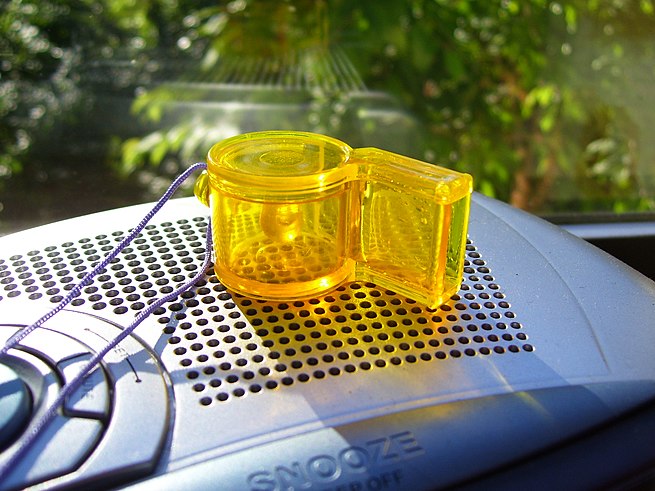
-
Whistle
A whistle is an instrument which produces sound from a stream of gas, most commonly air. It may be mouth-operated, or powered by air pressure, steam, or other means. Whistles vary in size from a small slide whistle or nose flute type to a large multi-piped church organ.
Whistles have been around since early humans first carved out a gourd or branch and found they could make sound with it. In prehistoric Egypt, small shells were used as whistles. Many present day wind instruments are inheritors of these early whistles. With the rise of more mechanical power, other forms of whistles have been developed.
One characteristic of a whistle is that it creates a pure, or nearly pure, tone. The conversion of flow energy to sound comes from an interaction between a solid material and a fluid stream. The forces in some whistles are sufficient to set the solid material in motion. Classic examples are Aeolian tones that result in galloping power lines, or the Tacoma Narrows Bridge (the so-called “Galloping Gertie” of popular media). Other examples are circular disks set into vibration.Depending on the geometry, there are two basic types of whistles: those that generate sound through oscillations of fluid mass flow, and those that generate sound through oscillations of the force applied to the surrounding medium.
-
Catcall
Street harassment is a form of sexual harassment that consists of unwanted comments, gestures, honking,
wolf-whistlings, catcalling, exposure, following, persistent sexual advances, and touching by strangers in public areas such as streets, shopping malls, and public transportation. According to the founder of the non-profit organization Stop Street Harassment, it can also consist of physically harmless behavior, such as “kissing noises” and “non-sexually explicit comments,” to “more threatening behavior” like stalking, flashing, sexual assault, and rape.Recipients include people of all genders, but women are much more commonly victims of harassment by men. According to Harvard Law Review (1993), street harassment is considered harassment done primarily by male strangers to females in public places. In 2014, researchers from Cornell University and Hollaback! conducted the largest international cross-cultural study on street harassment. The data suggests that the majority of females have their first street harassment experience during puberty.In much of South Asia, public sexual harassment of women is called “eve teasing”. The Spanish term piropos most widely used in Mexico holds a similar effect. Studies show that what is considered street harassment is similar around the globe. Many perpetrators of these actions would not characterize them as harassment, though most recipients would. Harassment can also be disproportionately directed at those with what is perceived by passers-by as a non-typical gender identity or sexual orientation.Taking photos of strangers without permission, as street photography and photojournalism practitioners do, is not considered street harassment.
-
Whistle (noun)
A device designed to be placed in the mouth and blown, or driven by steam or some other mechanism, to make a whistling sound.
-
Whistle (noun)
An act of whistling.
-
Whistle (noun)
A shrill, high-pitched sound made by whistling.
-
Whistle (noun)
Any high-pitched sound similar to the sound made by whistling.
“the whistle of the wind in the trees”
-
Whistle (noun)
A suit (from whistle and flute).
-
Whistle (noun)
The mouth and throat; so called as being the organs of whistling.
-
Whistle (verb)
To make a shrill, high-pitched sound by forcing air through the mouth. To produce a whistling sound, restrictions to the flow of air are created using the teeth, tongue and lips.
“Never whistle at a funeral.”
“She was whistling a happy tune.”
-
Whistle (verb)
To move in such a way as to create a whistling sound.
“A bullet whistled past.”
-
Whistle (verb)
To send, signal, or call by a whistle.
-
Catcall (noun)
A shout or whistle expressing dislike, especially from a crowd or audience; a jeer, a boo.
-
Catcall (noun)
A shout, whistle, or comment of a sexual nature, usually made toward women
-
Catcall (noun)
A whistle blown by a theatre-goer to express disapproval.
-
Catcall (verb)
To make such an exclamation.
